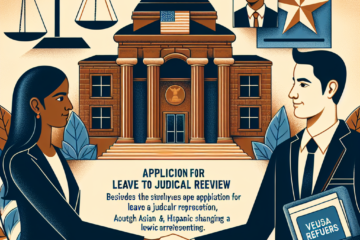Table of contents
Introduction and Summary of the Case
In the case of Singh v Canada (Citizenship and Immigration), 2023 FC 497, the applicants, Samunder Singh, his wife Lajwinder Kaur, and their minor child, were citizens of India and sought judicial review of individual decisions by a visa officer dated June 3, 2022. The visa officer refused their temporary resident visa or visitor visa applications. Mr. Singh and his family had planned to remain in Canada for three weeks, with the main purpose of their trip being to attend the convocation of their daughter, who was living in Canada on a valid study permit and graduating from the Manitoba Institute of Trades and Technology. The applicants also intended to visit family and sightsee around Winnipeg. While in Canada, they would have been staying with their daughter, although they would have taken on their own expenses.
The visa officer was not satisfied that the applicants would leave Canada at the end of their stay, as is required pursuant to paragraph 179(b) of the Immigration and Refugee Protection Regulations, SOR/2002-227, based on their financial situation, their socio-economic status, and the purpose of their visit.
The Court’s Analysis of the Visa Officer’s Decision Regarding the Applicant’s Financial Situation
The applicants submitted several financial documents to support their request, demonstrating their ability to afford the proposed visit and their financial establishment in India. They included an assessment from a chartered accountant, which was referenced in their written submissions. According to the assessment, the applicants had savings of approximately $36,000 in their bank accounts to cover their travel expenses. Additionally, they possessed other movable assets, such as vehicles and jewelry, valued at around $15,000. Moreover, they had immovable and business assets worth over $2 million, including residential and agricultural properties in India.
However, in analyzing the decisions made by the visa officer, Justice Pamel stated it was evident that the visa officer lacked the necessary justification, transparency, and intelligibility expected of a reasonable decision. It was unclear which factors the visa officer considered in making these decisions. Despite the applicants’ evidence of ties to India and their travel history, which seemed to support their intention to leave Canada at the end of their stay, the decisions of the visa officer appeared to be solely based on the applicants’ financial situation and assets.
Remarkably, the reliability of the applicants’ evidence was not questioned by the visa officer. The reasons provided do not indicate whether the visa officer properly assessed the applicants’ socio-economic situation by considering their agricultural income in relation to their significant property holdings. The visa officer failed to provide any insight into how such an assessment, if conducted at all, was carried out.
Moreover, the visa officer did not offer an explanation or justification for deeming the applicants’ socio-economic situation problematic or concerning. This omission raises further concerns regarding the rationale behind the decisions made by the visa officer.
Overall, it can be concluded that the decisions of the visa officer lacked transparency, failed to provide proper justifications, and did not sufficiently consider all relevant factors, including the applicants’ agricultural income and significant property holdings.
Consequence and Result of the Case
It was accepted that it was not a simple matter of reviewing the applicants’ bank accounts and, if they had sufficient funds, granting them a visa. Justice Pamel found that the visa officer had to conduct a more detailed and fulsome investigation about the source, nature, and stability of these funds to determine whether their trip to Canada was a reasonable expense. It was not the role of the Court to speculate on how the visa officer arrived at a particular conclusion, and it was not for counsel for the Minister to fill in the gaps in order to justify the decisions by the visa officer (Shohratifar v Canada (Citizenship and Immigration), 2023 FC 218 at para 12).
Overall, the visa officer’s reasons were found to be not clear or transparent, leaving no room for the Court to see how the dots, if any, were connected to understand the reasoning that led to the officer’s conclusion. For that reason, the visa officer’s decision had to be set aside and the application would be redetermined by another another visa officer.
Please note: This blog is not meant to be shared as legal advice. If you wish to speak to or meet with one of our legal professionals, please book a consultation here!
To read more Pax Law court decisions in the Federal Court, you can do so with Canadian Legal Information Institute by clicking here.



0 Comments